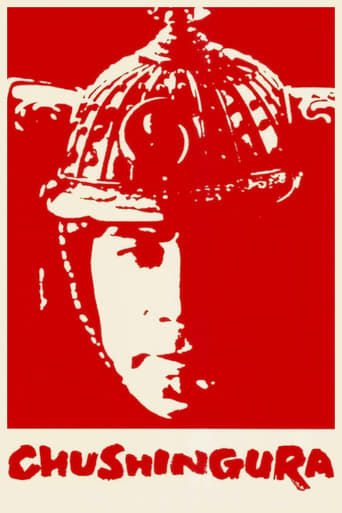rbarrett-1
In 1962, Toho Ltd. released "Chuchingura" as an anniversary piece. At nearly four hours' length, it almost requires a devotion to Japanese cinema and the culture's many nuances to appreciate. But it is exquisitely filmed in Toho Vision, right down to the fluttering cherry blossoms and snow tumbling from trees, and the costumes, sets and makeup win my awards for best I've seen from Tokyo. Having been to Japan and studied Japanese literature and language in the '60s, it was fairly easy for me to get into the story. Indeed, it has been written about many times, and anyone who has read one of the stories should be able to follow the plot. Like many epic films, it begins to bog down in the center, as the ronin go their separate ways and take up all matters of industry and living conditions, fall in love or not, waiting for the day of retribution. We are led up to that point with the unfolding of the drama behind the story. The fast-paced conclusion brings it all together and ends, rather abruptly I thought, with a narrative about what happens once the deed was fulfilled. It's a story of loyalty and courage to the nth degree. The bushido code is one of Japan's most revered cultural elements and it is celebrated here. If you can tolerate the length, the film is definitely worth a look, if for no other reason than to understand more about what the Japanese samurai life in the 18th and 19th centuries was like.
jafra1
It is unfortunate, to say the least, that the original 1962 incredibly loving critiques are no longer in print regarding the true nature of the origin, history and creation of this film. When I first saw it in 1963 (at the Castro, I believe, in S.F.) there was a lengthy story "blown up" on display board in the entryway. This film was a one-of-a- kind deliberate and heartfelt "gift to the world", created by a group of Japanese artists using film as their medium. This particular film was a reflection of what happened in the hearts of sentient Japanese artists AFTER Japan's defeat in WWII. Out of profound dignity they crafted this film to tell of the truest, deepest beauty of their culture, revealing it through the vulnerable opening of their hearts and sharing the story of the true Japan. In a manner similar to "The Passion" of our time, there was always a great historical purpose to this gift -- not merely a commercial undertaking. Thus, I believe the HISTORY of this film holds an even more noble place than the film itself, which happens to be a masterpiece painted with the love of its creators.
Ldixon-1
I consider this to be the greatest almost-unknown film of all time. I haven't seen it in 40 years, yet I can still remember scenes from it!It played in a theater in Berkeley CA for 1 or 2 years straight, around 1964, and I saw it twice at that theater.The story is based on a classic Japanese legend, so that there are many different movie versions - but as far as I've heard, this is the best.I have no idea where to find a vhs or dvd copy at this time... perhaps someone reading this knows.
funkyfry
Intense emotions and an ethic of honor and duty are at war in this medieval Japanese epic. When a lord is provoked into drawing his blade in anger in the emperor's house, law mandates that he kill himself and that his clan be dissolved in disgrace. A number of samurai in his clan make a pact, deciding it better to seek revenge on the one who provoked their lord than to die fighting to defend his castle. To this end, Their leader pretends to have dissipated himself in whores and wine, while he bides time and gathers forces. When the fatal moment arrives, some samurai don't show. Some thrilling action scenes, but way too much talking, too many indistinct characters, and generally very dry and impersonal. Mifune makes a brief appearance. Memorable night battle for the climax.


